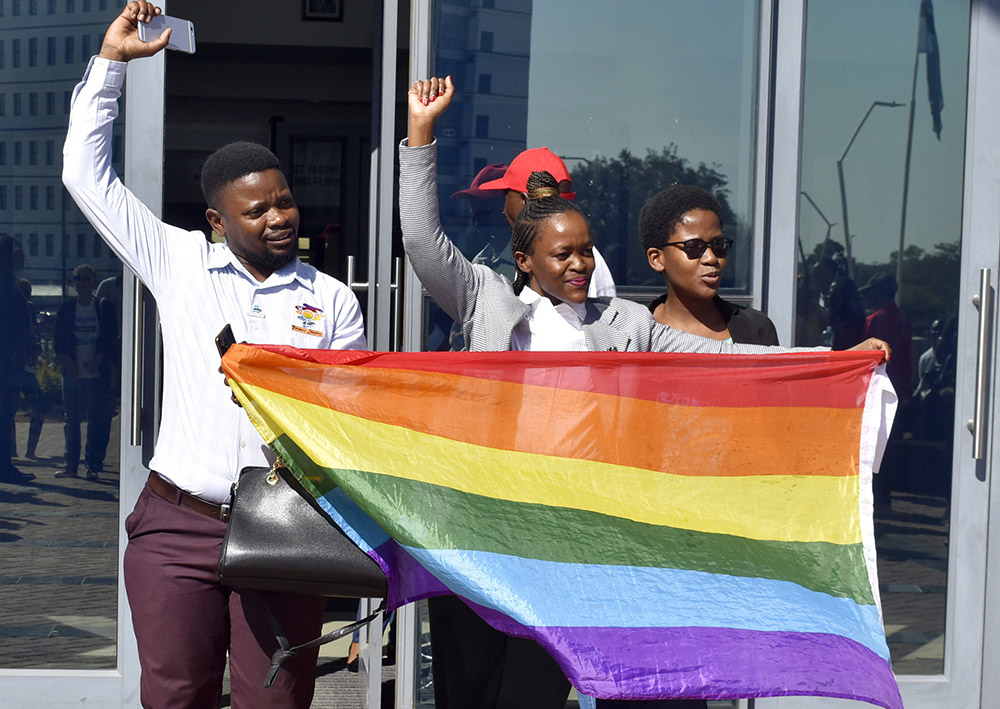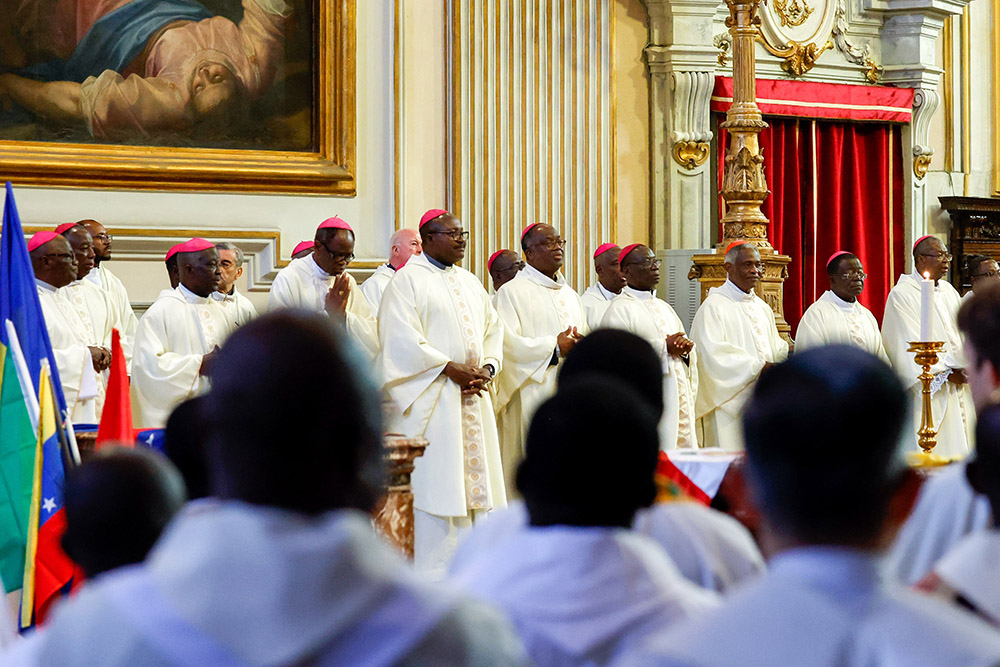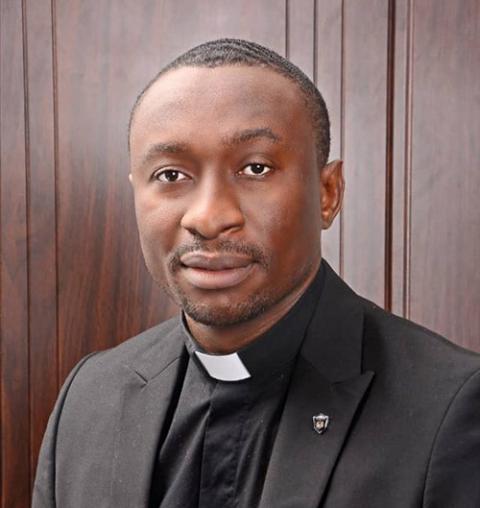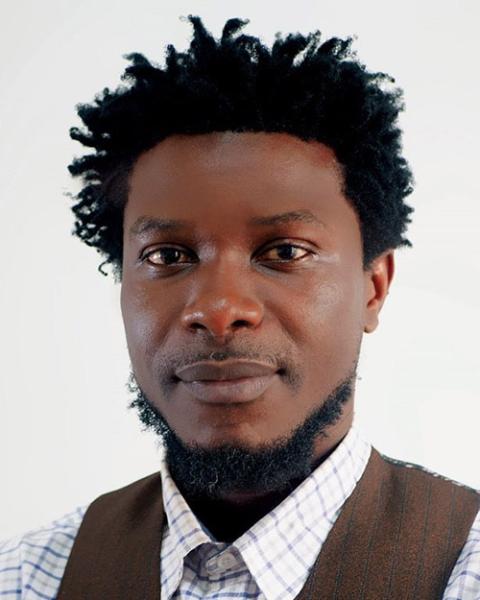
In Gaborone, Botswana, activists celebrate a High Court decision that decriminalized gay sex on June 11, 2019. In response to a December 2023 Vatican document allowing blessings of same-sex couples, the Catholic bishops of Southern Africa, including Botswana, said they would provide a guide on how such a blessing may be requested or granted to avoid confusion on Catholic teaching. (AP Photo, File)
The Vatican's unexpected Dec. 18 declaration permitting nonliturgical blessings of same-sex couples has sparked divided reactions across the African continent, with LGBTQ activists praising the move while several local Catholic bishops' conferences have issued statements reiterating that the church still does not approve of gay marriage.
Same-sex relationships remain prohibited in many African countries. One Nigerian priest, Schoenstatt Fr. Ugochukwu Ugwoke told NCR that the Vatican's new document "seems to be shrouded in ambiguity and many people are confused."
Ugwoke is one of many priests across the African continent who have voiced strong criticisms of the new Vatican document. He said there are currently two groups — those who agree with the declaration and those who oppose it on the grounds that it may change the church's position on marriage being a sacramental union between a man and woman.
"Those against it [say] it appears to be a tacit approval of same-sex union," he says. "They feel this is a subtle way of approving same-sex marriage and that if they do not react, then they are going to make a full-blown legitimization of gay marriage within the Catholic Church."
While the declaration approves blessings for same-sex unions by priests, it does not permit liturgical ceremonies or rites for those couples.
"People are of the view that blessing seems to be an approval. When you bless something, you bless, you endorse," Ugwoke said.
In South Africa, Jesuit Fr. Nobert Munekani said there are those who are receptive to the declaration and those who are completely against it.
"It comes with a lot of confusion and misrepresentation to many people," he said.
Munekani, who is parish priest at St. Martin de Porres Catholic Church in Orlando West, Johannesburg, said it is important that the declaration explored the possibility of blessing same-sex couples without any form of ritualization or offering the impression of a marriage.
Jesuit Fr. Nobert Munekani, assistant pastor at Holy Trinity Catholic Church in Johannesburg, South Africa (Patrick Egwu)
"If you listen to people who are pro same-sex marriages, they actually have elevated this declaration to the level of the church having now accepted homosexual marriages. But that's clearly not what it is, and this still brings about confusions and anxieties among the faithful and the people of God."
'An enormous breakthrough'
Ricus Dullaert, an LGBTQ activist, described the declaration as an "enormous breakthrough" for the community.
Dullaert, who is the founder of an LGBTQ support group at Holy Trinity Catholic Church in Johannesburg, said the approval by the church hierarchy is an enormous step forward and a radical shift from the previous policies held by Pope Francis' predecessors.
"We are happy about that," he said. "This will give more progressive forces in the church an opening to do something in that field of blessing gay relations which is quite a revolution."
Back in 2014, Dullaert and his Nigerian spouse, Sylvester, held a small ceremony at the Chapel of Our Lady in Amsterdam to celebrate their union.
Advertisement
Dullaert said that while the church has taken an important progressive step toward blessing same-sex relationships, the declaration has its own limitations.
"It's a marginalized blessing," he said. "The document has some strings attached because it goes to great lengths to explain that this blessing of 'irregular relationships,' as they described it, should be not equaled to a marriage and especially with gay people. They kept emphasizing that aspect and also saying that it shouldn't take place in a liturgical setting that looks like a marriage."
Responding to the opposition to the Vatican declaration, he said members of the LGBTQ community will see the declaration as an endorsement or as a sign of acceptance of their relationship, including a sexual relationship.
"That's another field where the problem lies. Now if you start to bless people, then the question will be what's the idea behind it? Do you accept their relationship which sex is part of or do you do it to encourage them to lead a chaste life?"
Henry Ugwu, a Nigerian LGBTQ social change advocate, said the declaration was long overdue, noting that it's another significant step toward accepting that LGBTQ individuals are created by God and are deserving of love and acceptance from the church.
"There is no reason why gay individuals should be excluded from the Catholic Church. They are part of the society," he said. "Fifty years from now, there's a greater chance that the church will fully accept gay people and gay marriage. There were generations where women had no rights to vote. We look at that generation now as barbaric. Maybe 100 years from now, the generation at the time will look at the Catholic Church as barbaric for not allowing married adults into the church."
Ugwu said the declaration will stimulate uncomfortable conversations, potentially enlightening future generations of priests.
"These discussions have the power to outlast the biases of current priests, paving the way for substantial and lasting change in the future," he said.
Pushback from African bishops
African bishops and local dioceses have responded to the declaration with clarifications for the Catholic community, while emphasizing their staunch stands against liturgical blessings for same-sex marriages.
The Catholic Bishops' Conference of Nigeria, in a Dec. 20 statement, said the teaching of the Catholic Church on marriage remains the same, adding that there is "no possibility in the teaching of the Church of blessing same-sex unions and activities. That would go against God's law, the teachings of the Church, the laws of our nation, and the cultural sensibilities of our people."
The bishops, however, said the declaration reinforces the truth about God's mercy and that those asking for blessing have demonstrated one's trust in God and the desire to live according to his will.
The Ghana Catholic Bishops' Conference said it was providing clarification on the declaration, due to growing false media reports that it said have caused anxiety and confusion among many people.

Bishops from Ghana concelebrate Mass at Rome's Basilica of St. Mary of the Angels and Martyrs May 21, 2023. (CNS/Lola Gomez)
The bishops said priests cannot bless same-sex unions or marriages. They explained that the blessing mentioned in the declaration is one that can be given to anyone who asks for it, especially those in a state of sin, seeking conversion.
In response to the declaration, the Catholic bishops of Southern Africa said: "Marriage remains exclusive between a man and a woman."
In a statement released by the Southern African Bishops' Conference, which includes South Africa, Botswana and Eswatini, the bishops said the blessing in the declaration is done with the hope of conversion and does not equate to approving a way of life that is contrary to God's will. They added that they would provide a guide on how the blessing may be requested or granted to avoid confusion.
Munekani, the South African priest, said the Vatican document "should not be read or understood as an endorsement to same sex unions, but as rather a response to numerous questions about the possibility of imparting a blessing on same sex couples."
Ugwoke, the Nigerian priest, told NCR that he won't refuse to bless anyone, but said he would continue to denounce homosexuality in clear terms as a sin against God, and against the order of creation. Amid growing confusion on the declaration, he said the Vatican should release another statement to provide more clarity and douse tensions.
"The declaration has not distorted this understanding of God's position against homosexuality," he said. "When you bless anyone, you are not blessing what they are doing or the irregular situation they have entangled themselves in. The blessing is not sacramental, which approves or endorses their union. The blessing you're giving is simply an act of piety."










